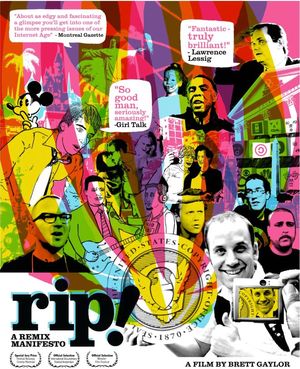See This: RiP! A Remix Manifesto
By Rob Christopher in Arts & Entertainment on Jul 20, 2009 3:40PM
 When we heard about a new documentary featuring the music of Girl Talk, one of our all-time favorite interview subjects, we couldn't wait to see it. And that isn't hard: RiP! A Remix Manifesto is available online as a pay-what-you-want download. We're sure glad we did. It's the most clearly articulated work on copyright and remix culture that we've ever seen.
When we heard about a new documentary featuring the music of Girl Talk, one of our all-time favorite interview subjects, we couldn't wait to see it. And that isn't hard: RiP! A Remix Manifesto is available online as a pay-what-you-want download. We're sure glad we did. It's the most clearly articulated work on copyright and remix culture that we've ever seen.
Girl Talk's music stands as the perfect illustration of what makes remix culture so vibrant and thrilling. There's priceless footage of the Pittsburgh mash-up artist in concert. We also see him working on his laptop while in bed, and having a conversation with his parents (his father slyly chides him for taking off his pants onstage all the time). Meanwhile we hear from copyleft advocates like Lawrence Lessig and Cory Doctorow, who sketch out the surprising history of U.S. copyright law and enumerate the reasons why this is one of the most important issues of the 21st Century.
Its most brilliant sequence concisely illustrates the first two points of the Remixer's Manifesto (Culture always builds on the past; The past always tries to control the future). It shows how a work song from the cotton fields made its way to Muddy Waters, via Robert Johnson and Son House, then the Rolling Stones, was covered by the Andrew Oldham Orchestra and, years later, sampled by The Verve, who were then sued by Richards' and Jagger's publishers. The case of "Bittersweet Symphony" is only one of the more ironic examples of the many times where the wealthiest, most powerful link in the chain of creative expression has fought for exclusive control.
The movie unnecessarily complicates its argument by wading into the thorny issue of patents, which are in many ways quite different from copyright. It also sidesteps the differences between remixing and piracy, again very different; the former can be defended as a creative act, but the latter is just out and out theft. But those are tiny quibbles, because the movie really does an excellent job of presenting this issue with humor and passion. A Stephen Colbert mash-up, which plays over the end credits, is hilarious.
There are no Chicago screenings planned, but under the movie's unique distribution system anyone can host a screening, charge whatever they like and keep 100% of the proceeds. Any volunteers?